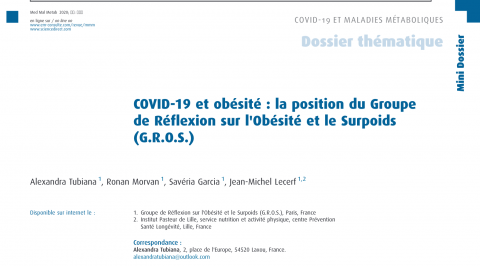Résumé
Au-delà de l'âge, qui reste le principal facteur de risque, il existe une grande variété de comorbidités associées aux formes graves de la maladie à coronavirus 2019 (COVID-19). L'obésité est la seule ayant entraîné une réaction du monde médical et social aussi insistante. Cette insistance constitue-t-telle un moyen pertinent et efficace d'aborder la problématique du lien aggravant entre la COVID-19 et obésité ? Cette mise en avant de l'obésité a une répercussion immédiate sur la santé mentale des patients, rajoutant aux difficultés dont ils souffrent déjà, la détresse psychique directement associée à la perception des discriminations dont ils sont victimes. La réitération massive et obsédante (jusqu'à la culpabilisation) de la vulnérabilité des patients obèses va générer ou majorer des troubles psychiques qui, à leur tour, aggraveront les compulsions alimentaires, et renforceront l'éloignement des parcours de soins que l'on constate fréquemment dans cette population. Les comportements liés à la situation inédite des confinements et les discours alarmistes autour de l'alimentation et de la santé sont si contradictoires que leurs effets, favorisant la restriction cognitive, risquent de provoquer des troubles du comportement alimen- taire chez des nouveaux patients ou d'aggraver ceux déjà existant.
Summary
Beyond age, which remain the main risk factor, there is a wide range of comorbidity associated with severe forms of the coronavirus disease 2019 (COVID-19). Obesity is the only one that generated such a strong, almost discriminatory reaction in society or in the medical field. Is this hammering a relevant and efficient way of addressing the issue of the aggravating relationship between COVID-19 and obesity? Pointing out the topic of obesity has an immediate impact on patients’ mental health, adding up to increased difficulties they already experience, mental distress being directly associated to the perception of the discrimination they face. The massive and obsessing reiteration (so much that it ends up inducing culpability) of the vulnerability of obese patients is likely to generate or increase mental disorders that will, in turn, aggravate binge eating and reinforce the medical distancing already observed in this population. Behaviors initiated by the unprecedented situation of the lock down and the alarmist discussions about food and health are so contradictory that their impact of cognitive restraint may induce or worsen eating disorders in patients.
